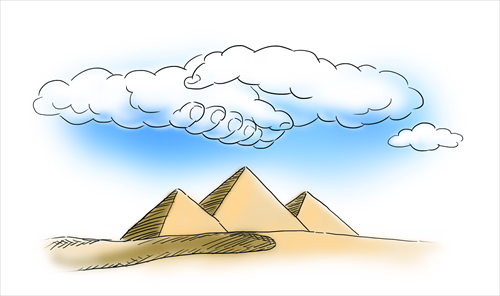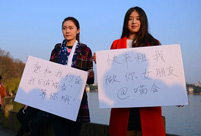


Illustration: Liu Rui/GT
China and Egypt established diplomatic ties in 1956. Egypt became the first African and Arab country to acknowledge China after the foundation of the PRC in 1949. With 2016 marking the 60th anniversary of the bilateral diplomatic ties, Chinese President Xi Jinping embarks on his trip to Egypt Tuesday. Cairo-Beijing relationship will see the best period of development in history.
Cairo is actively seeking for cooperation with Beijing in railway, aviation and new energy. Egypt is also expecting to make use of the "One Belt, One Road" initiative to meet mutual demands and be complementary in industries. It is worth mentioning that Beijing's "One Belt, One Road" initiative and the Suez Canal Area Development Project share a number of similarities. The "One Belt, One Road" initiative is becoming a significant bond linking China-Egypt economic cooperation. After the New Suez Canal is put into use in 2015, the Egyptian government plans to upgrade ports, embark on infrastructure projects and establish industrial parks in the Suez Canal region. The New Suez Canal will not only play an important role in global shipping, but also help attract foreign investments and promote regional industrial upgrading. This will be a significant opportunity for China.
The Executive Director of Egypt TEDA Investment Company Wei Jianqing, who is responsible for the operations management of cooperation zone, considers that the China-Egypt Suez Economic and Trade Cooperation Zone, which is adjacent to the Suez Canal and only two kilometers away from Egypt's third largest port Ain Sukhna, is not only a meeting-point of the "Silk Road Economic Belt" and the "21st Century Maritime Silk Road," but also a golden junction of the "One Belt, One Road" initiative and the Suez Canal Area Development Project. The zone is a gateway for China-Egypt economic and trade cooperation.
Wei is not overstating things. By the end of 2014, the starting area of 1.34 square kilometers was completed, attracting 62 enterprises and more than $900 million in investment. The construction work in the 6-square kilometer-expansion area will be launched soon. A number of large Chinese enterprises have already signed the agreements to settle in the zone.
The governor of Suez, Ahmed Helmi Fathi, says that the zone has reflected the joint will of Egyptians and Chinese to cooperate. With the joint efforts of both Egyptian and Chinese governments and entrepreneurs, the future of the zone will be bright.
The bilateral trade volume between Cairo and Beijing has reached $11.6 billion in 2014. China is now the largest trading partner of Egypt. Chinese direct investment in non-financial fields to Egypt has reached $97.51 million, with a year-on-year growth of 86 percent.
The rapid growth of Cairo-Beijing economic ties is closely linked to the improvement of the bilateral political relations. The two sides have carried out intense top-level exchanges since the establishment of the diplomatic ties on May 30, 1956. The Egyptian President Abdel Fattah el-Sisi, since coming into office in 2014, has attached great importance to developing friendly relations with Beijing. China was the first Asian nation that Sisi officially visited as president. The political foundation for bilateral cooperation has become more solid after the joint statement on Chinese-Egyptian comprehensive strategic partnership was signed in December 2014. Some argue that while Sisi's China visit has started a new era in China-Egypt relationship, Xi's trip will be a milestone in the development of China-Egypt friendship.
Despite the long distance, Egyptians are eager to know more about China. Ain Shams University was the first to teach Chinese in 1957. So far, 10 universities including Cairo University and Suez Canal University have launched Chinese language departments. Confucius Institutes were established in Cairo University and Suez Canal University in 2008 as well. A China-Egypt Culture Year will be held in 2016. Beijing will organize nearly 40 cultural activities in cities including Cairo, Luxor and Aswan. These activities will introduce Chinese traditional culture as well as its modern cultural achievements to Egypt.
The 2016 China-Egypt Culture Year is significant in deepening bilateral comprehensive strategic partnership, promoting people-to-people friendship and facilitating cultural exchanges of the two civilizations.
The author is an Egypt-based correspondent with People's Daily. Source: Global Times and People’s Daily
 PLA holds joint air-ground military drill
PLA holds joint air-ground military drill Charming female soldiers on Xisha Islands
Charming female soldiers on Xisha Islands Beautiful skiers wear shorts in snow
Beautiful skiers wear shorts in snow Getting close to the crew on China's aircraft carrier
Getting close to the crew on China's aircraft carrier Chinese stewardess celebrate test flight at Nansha Islands
Chinese stewardess celebrate test flight at Nansha Islands World's first 'underwater skyscraper'
World's first 'underwater skyscraper'  Pentagonal Mart becomes the largest vacant building in Shanghai
Pentagonal Mart becomes the largest vacant building in Shanghai "Rent me as your girlfriend!"
"Rent me as your girlfriend!" A beauty's dancing youth
A beauty's dancing youth Top 20 hottest women in the world in 2014
Top 20 hottest women in the world in 2014 Top 10 hardest languages to learn
Top 10 hardest languages to learn 10 Chinese female stars with most beautiful faces
10 Chinese female stars with most beautiful faces China’s Top 10 Unique Bridges, Highways and Roads
China’s Top 10 Unique Bridges, Highways and Roads Xi arrival shows commitment to Mideast
Xi arrival shows commitment to Mideast Chinese firm aims to build ‘world’s largest cloning factory’
Chinese firm aims to build ‘world’s largest cloning factory’ Qinghai Lake aircraft ban reveals risky trend in wildlife photography
Qinghai Lake aircraft ban reveals risky trend in wildlife photography Foreigners flock to China for cancer, chronic disease treatments
Foreigners flock to China for cancer, chronic disease treatmentsDay|Week